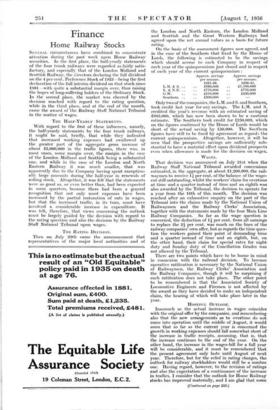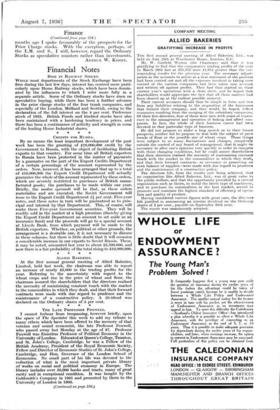Finance
Home. Railway Stocks SEVERAL circumstances have combined to concentrate attention during the past week upon Home Railway securities. In the first place, the half-yearly statements of the four trunk railways were regarded as fairly satis- factory, and especially that of the London Midland and Scottish Railway, the directors declaring the full dividend on the 4 per cent. Preference Stock of 1923—being the first declaration of the full interim dividend on that stock since 1931—with quite a substantial margin over, thus raising the hopes of long-suffering holders of the Ordinary Stock. In the second place, the market was cheered by the decision reached with regard to the rating question, while in the third place, and at the end of the month, came the award of the Railway Staff National Tribunal in the matter of wages.
THE HALF-YEARLY STATEMENTS.
With regard to the first of these influences, namely, the half-yearly statements by the four trunk railways, it might be said, briefly, that while they indicated that increased working expenses had swallowed up the greater part of the aggregate gross increase of about £2,000,000 in the traffic figures, there was, in most cases, some margin over, the margin in the case of the London Midland and Scottish being a substantial one, and while in the case of the London and North Eastern Railway it was much smaller, that was apparently due to the Company having spent exception- ally large amounts during the half-year in renewals of rolling stock. Altogether, it was felt that the statements were as good as, or even better than, had been expected in some quarters, because there had been a general recognition that not only must expenses have been increased by the partial restoration of cuts in wages, but that the increased traffic, in its turn, must have involved a considerable increase in expenditure. It was felt, therefore, that views concerning the outlook must be largely guided by the decision with regard to the rating question and also the decision by the Railway Staff National Tribunal upon wages.
THE RATING DECISION.
Then on July 29th came the announcement that representatives of the major local authorities and of the London and North _Eastern, the London Midland- and Scottish and the Great Western Railways had agreed upon the net annual values as a basis for future rating.
On the basis of the assessment figures now agreed, and in the case of the Southern that fixed by the House of Lords, the following is estimated to be the savings which should accrue to each Company in respect of each year of the quinquennium just closed and in respect of each year of the current quinquennium :
Approx. savings Approx. savings per annum. per annum.
1931-36. 193641.
L.M. & S. .. £960,000 . . £1,100,000 L. & N.E. £770,000 .. £770,000 G.W. £310,000 .. £430,000 Southern .. £300,000 ..
Only two of the companies, the L.M. and S. and Southern, took credit last year for any savings. The L.M. and S. credited the year's revenue with an estimated saving of £885,000, which has now been shown to be a cautious estimate. The Southern took credit for 1250,000, which on the figures confirmed by the House of Lords would be short of the actual saving by £50,000. The Southern figures have still to be fixed by agreement as regardi the current quinquennium. Altogether, however, it will be seen that the prospective, savings are sufficiently sub- stantial to have a material effect upon dividend prospects even when allowance is made for the decision on wages.
WAGES.
That decision was announced on July 31st when the Railway Staff National Tribunal awarded concessions estimated, in the aggregate, at about £1,200,000, the rail- waymen to receive 11 per cent. of the balance of the wage- cut still outstanding, whilst the workers' claim for overtime at time and a quarter instead of time and an eighth was also awarded by the Tribunal, the decision to operate for a year from the 16th of this month. The decision was reached after an exhaustive enquiry on the part of the Tribunal into the claims made by the National Union of Railwaymen and the Railway Clerks' Association, together with the statements made by the four Main Line Railway Companies. So far as the wage question is concerned, the deduction of 11 per cent. from all earnings to replace the 21 per cent. was much on the lines of the railway companies' own offer, but as regards the time ques- tion the workers gained their point of demanding time and a quarter instead of time and an eighth, but, on the other hand, their claim for special rates for night duty and Sunday duty of the Conciliation Grades was not allowed by the Tribunal.
There are two points which have to be borne in mind in connexion with the railroad decision. To become operative ratification is necessary by the National Union of Railwaymen, the Railway Clerks' Association and the Railway Companies, though it will be surprising if such ratification does not take place. The other point to be remembered is that the Associated Society of Locomotive Engineers and Firemen is not affected by the award as they have decided to make an independent claim, the hearing of which will take place later in the year.
HOPEFUL OUTLOOK.
Inasmuch as the actual increase in wages coincides with the original offer by the companies, and remembering also that the new arrangements as to overtime do not come into operation until the middle of August, it would seem that so far as the current -year is concerned' the growth in working- expenses should fall somewhat short of the increase in traffic receipts, assuming, that is, that the increase continues to the end of the year. On the other hand, the increase in the wages-bill for a full year will be considerable, and it must be remembered that the present agreement only lasts until August of next year. Therefore, but for the relief in rating charges, the outlook for railway_ stockholders would still be a sombre one. Having regard, however, to the revision of ratings and also the expectation of a continuance of the increase in traffics, I consider that the outlook for Home Railway stocks has improved materially, and I am glad that some
(Continued on page 255.)
Finance
(Continued from page 254.)
months ago I spoke favourably of the prospects for the Prior Charge stocks. With the exception, perhaps, of the L.M. and S., I still, however, regard the Ordinary Stocks as speculative counters rather than investments.
ARTHUR W. KIDDY.







































 Previous page
Previous page